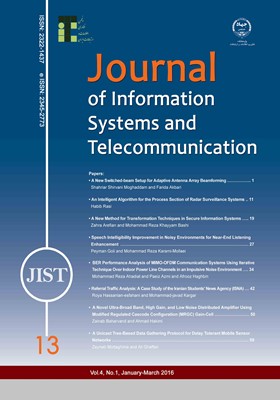-
-
List of Articles
-
Open Access Article
1 - A New Switched-beam Setup for Adaptive Antenna Array Beamforming
Shahriar Shirvani Moghaddam Farida Akbari -
Open Access Article
2 - An Intelligent Algorithm for the Process Section of Radar Surveillance Systems
Habib Rasi -
Open Access Article
3 - A New Method for Transformation Techniques in Secure Information Systems
Hojatallah Hamidi -
Open Access Article
4 - Speech Intelligibility Improvement in Noisy Environments for Near-End Listening Enhancement
Peyman Goli Mohammad Reza Karami-Mollaei -
Open Access Article
5 - BER Performance Analysis of MIMO-OFDM Communication Systems Using Iterative Technique Over Indoor Power Line Channels in an Impulsive Noise Environment
Mohammad Reza Ahadiat Paeez Azmi Afrooz Haghbin -
Open Access Article
6 - Referral Traffic Analysis: A Case Study of the Iranian Students' News Agency (ISNA)
Roya Hassanian Esfahani Mohammad Javad Kargar -
Open Access Article
7 - A Novel Ultra-Broad Band, High Gain, and Low Noise Distributed Amplifier Using Modified Regulated Cascode Configuration (MRGC) Gain-Cell
Zainab Baharvand Ahmad Hakimi -
Open Access Article
8 - A Unicast Tree-Based Data Gathering Protocol for Delay Tolerant Mobile Sensor Networks
Zeynab Mottaginia Ali Ghaffari
-
The rights to this website are owned by the Raimag Press Management System.
Copyright © 2017-2026







